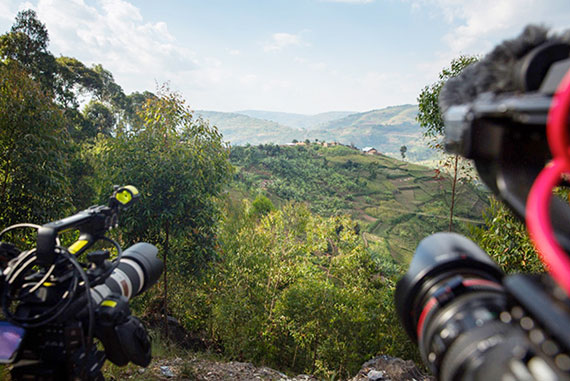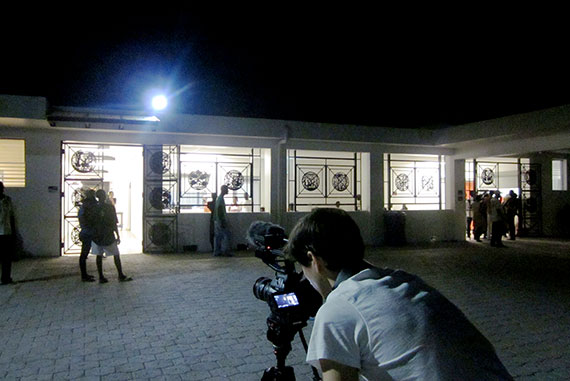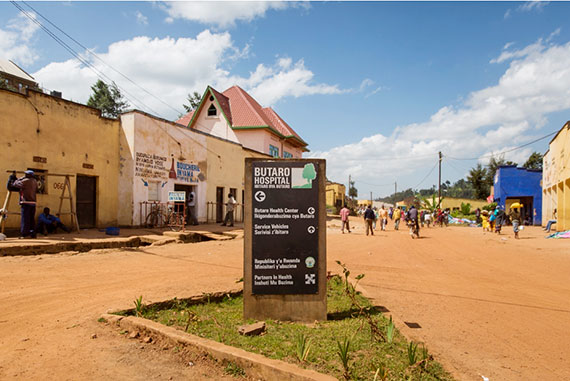Video courtesy of HarvardX
MOOCs on the move
HarvardX not only serves many students overseas, it’s creating content there too
As MOOCs grow in influence and sophistication, they’re no longer simply reimagined in a Harvard classroom or even in a nearby studio. Recently, transforming a residential course — going digital via HarvardX — included filming in far-flung Rwanda and Haiti.
Increasingly, professors are going to great lengths to ensure that the intellectual heft of the original class is maintained or even enhanced in a massive open online course, even if that means going halfway around the world to film material. That was the case with “Global Health: Case Studies from a Biosocial Perspective,” which looks at international health problems within their social and political contexts.

The course was developed by Arthur Kleinman, Esther and Sidney Rabb Professor of Medical Anthropology in the Faculty of Arts and Sciences, and Paul Farmer, Kolokotrones University Professor of Global Health and Social Medicine at Harvard Medical School (HMS), and is currently taught by them with HMS’ Anne Becker, Maude and Lillian Presley Professor of Global Health and Social Medicine, and Salmaan Keshavjee, associate professor of global health and social medicine.
“The idea is that health care isn’t just a service you’re providing that is divorced from everything else around,” said Keshavjee. “You need to look at the politics, the economics, all the ethics of the social world. It’s a more holistic way of thinking.” Or, as Kleinman puts it, “We use social theory, history, and ethnography to provide a deep context for understanding public health problems and for improving implementation of public health interventions.”
As HarvardX project lead April Opoliner explains, the nature of the course is unique to Harvard. “It’s different from most global health courses in that it’s taught by four physician-anthropologists,” said Opoliner, who helped the faculty translate their vision as a combination digital producer, instructional designer, and content manager. Opoliner also has a doctorate in public health.
The trip to Haiti in December 2013 was one way of spelling out the mission to integrate social and political issues with health care. The Harvard on-site team — Farmer, Becker, Opoliner, and a videographer — spent a nearly 48 hours straight doing interviews and gathering footage.

There are skilled and talented doctors in Rwanda, Opoliner notes, who would be more inclined to stay and practice in their home country if the infrastructure and support system were in place.
“In Haiti, we met a wonderful woman named Adeline who was so sick in the ’90s that her family had bought her coffin,” she said. “She’s now a community health worker, a paid individual who connects people with the drugs that meet their needs. We had the opportunity to learn from her what it meant to be ill, to learn from her the challenges that people face, and for her to tell us why global health equity is important. ”
These found stories are finding a wide audience. Since the course went online, it’s been taught at other universities. Medical students in Rwanda have taken it, and it was used in medical courses at the University of Giessen in Germany.
“They used our course in innovative ways, watching our lectures and carrying that into their classroom discussion. They saw the MOOC as an important teaching tool,” says Keshavjee.

One advantage of the MOOC is that digital materials can be incorporated to show a variety of perspectives. Becker points to a lecture she gives on global mental health, how teachers are being trained to recognize signs of mental illness and help the students navigate toward care.
“Using the videos [from Haiti], we could now hear from members of the research team. We could hear from teachers who would comment on the research as applied. And we could hear from the co-investigators, whose findings would normally just be summarized by the professor. It made for a much richer perspective, it wasn’t just about me standing there talking.”
That richer perspective has found its way to Harvard Yard as well. While the MOOC materials are not yet part of the standard curriculum for the course, they’re available to students as supplemental material.
More like this
“It really changed the way we do the course,” Keshavjee said. “To do the MOOC, you had to really condense your thoughts into these kinds of nuggets that could be delivered in 10 to 15 minutes, and be extremely clear to people taking it. That enabled us to hone our teaching, almost as if we were making a documentary. What images could we show that would get the point across?”
To measure how well the points got across, Opoliner cites an online survey in which the MOOC learners were asked to give the first word that came to mind when thinking of global health care.
“Before the course, you had words like poverty, inequality, disease, HIV, malaria. And after, you saw words like equity, care-giving, compassion … and poverty is still there. So that shift in how you approach the problem is really what the course is about.”
Students in more than 100 countries have earned certificates of completion for the MOOC. While many are studying medicine, others are in law or related professions. And as Keshavjee points out, not everyone who will work in health care is a doctor, and the issues raised in the course can be applicable beyond medicine.
“Everybody needs to be treated with quality and dignity, and [the Rwanda and Haiti footage] shows what can be done. It opens the mind and broadens the idea of the possible. The main question we’re asking is, ‘How can we get high-quality health care to everybody who needs it?’”
Those tuning into that message include amateurs and experts, and even a leader of a Harvard School. David Hunter, acting dean at the Harvard T.H. Chan School of Public Health, whose MOOC for HarvardX will launch in November, expressed pride in his certificate of completion for the course. It is framed in his office.





